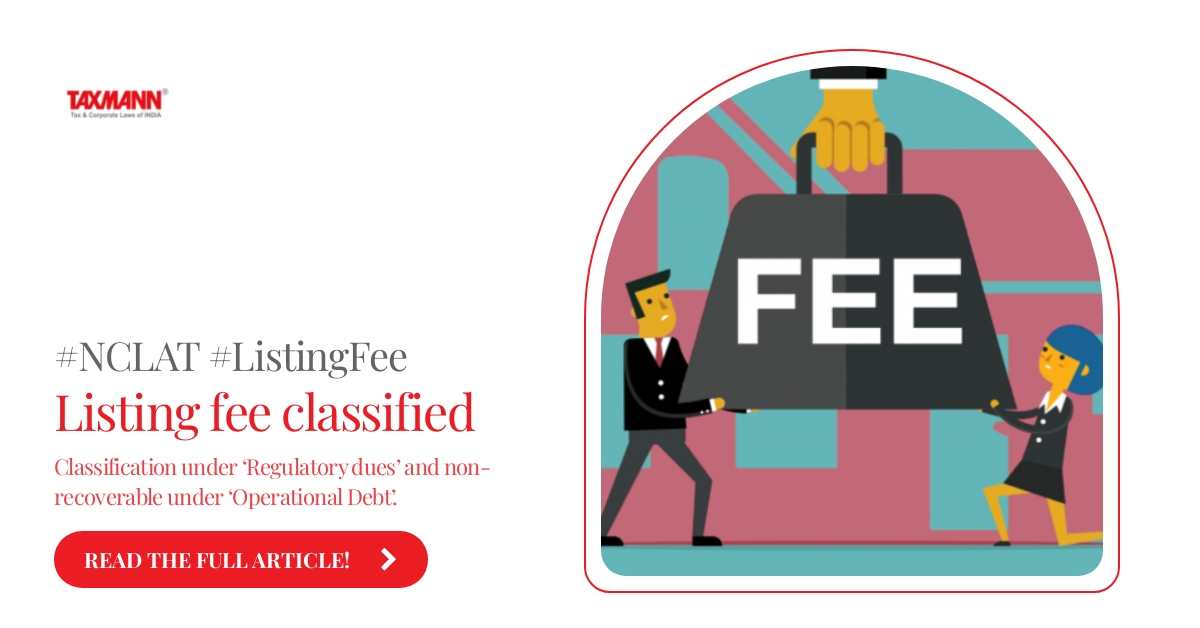Listing fee classified under ‘Regulatory dues’ and non-recoverable under ‘Operational Debt’
- Blog|News|Insolvency and Bankruptcy Code|
- 2 Min Read
- By Taxmann
- |
- Last Updated on 15 March, 2022

Case Details: BSE Ltd. v. ACIL Cotton Industries Ltd - [2022] 136 taxmann.com 29 (NCLAT- New Delhi)
Judiciary and Counsel Details
-
- Anant Bijay Singh, Judicial Member and Ms. Shreesha Merla, Technical Member
- Ms. Surekha Raman, Adv. for the Appellant.
Facts of the Case
In the instant case, the appellant (the operational creditor) was a recognized stock exchange company. A Listing Agreement was executed between the appellant and respondent-corporate debtor (ACIL) which was earlier Adeshwar CottonIndustries.
As per Listing Agreement, the respondent was obligated to pay requisite Annual Listing Fees (ALF). The Appellant claimed that the respondent failed to make payment of ALF after 28-6-2013.
The Appellant issued a demand notice dated 15-3-2019 to the respondent calling upon the respondent to make payment outstanding ALF. The Appellant instituted an application under section 9 for initiating CIRP against the respondent.
The Adjudicating Authority by impugned order dismissed said application. The Adjudicating Authority doubted the Listing Agreement and held that petition was barred by limitation.
NCLAT Held
On appeal, the NCLAT held that since no agreement was entered between present respondent i.e. ACIL and appellant, the agreement so filed couldn’t be relied upon as same was not a valid agreement in the eyes of law. Since the date of default was 28-6-2013, the application filed under section 9 in 2019 was barred by limitation.
The NCLT also held that listing fees comes under ambit of ‘Regulatory dues’, which SEBI is entitled to recover and Stock Exchange being an entity registered under SEBI, is under an obligation to follow Regulations prescribed by SEBI for recovery of its dues, such dues are not ‘Operational Dues’ but are ‘Regulatory Dues’ and Regulatory Dues are not to be recovered under ‘Operational Debt’.
Case Review
-
- BSE Ltd. v. ACIL Cotton Industries Ltd. [2022] 136 taxmann.com 28 (NCLT – Ahd.) (para 19) affirmed. [See Annex].
- BSE Ltd. v. Neo Corp. International Ltd. [Company Appeal (AT) Insolvency No. 472 of 2018, dated 5-4-2019] (para 17) distinguished.
List of Cases Referred to
-
- BSE Ltd. v. Neo Corp. International Ltd. [Company Appeal (AT) (Insolvency) No. 472 of 2018, dated 5-4-2019] (para 9).
Disclaimer: The content/information published on the website is only for general information of the user and shall not be construed as legal advice. While the Taxmann has exercised reasonable efforts to ensure the veracity of information/content published, Taxmann shall be under no liability in any manner whatsoever for incorrect information, if any.

Taxmann Publications has a dedicated in-house Research & Editorial Team. This team consists of a team of Chartered Accountants, Company Secretaries, and Lawyers. This team works under the guidance and supervision of editor-in-chief Mr Rakesh Bhargava.
The Research and Editorial Team is responsible for developing reliable and accurate content for the readers. The team follows the six-sigma approach to achieve the benchmark of zero error in its publications and research platforms. The team ensures that the following publication guidelines are thoroughly followed while developing the content:
- The statutory material is obtained only from the authorized and reliable sources
- All the latest developments in the judicial and legislative fields are covered
- Prepare the analytical write-ups on current, controversial, and important issues to help the readers to understand the concept and its implications
- Every content published by Taxmann is complete, accurate and lucid
- All evidence-based statements are supported with proper reference to Section, Circular No., Notification No. or citations
- The golden rules of grammar, style and consistency are thoroughly followed
- Font and size that’s easy to read and remain consistent across all imprint and digital publications are applied



 CA | CS | CMA
CA | CS | CMA
